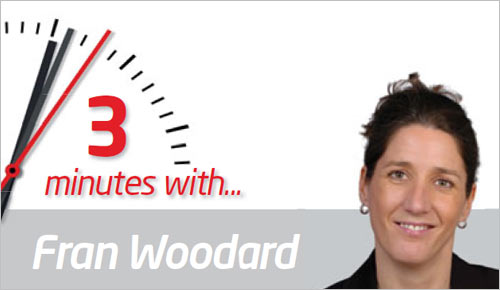Physio Fran Woodard, national director of a leading cancer charity, won an HSJ accolade for being an inspirational woman in healthcare.

What did the HSJ award mean to you?
It meant a huge amount. I was both humbled and honoured to be nominated for this award. When I received it in July I looked around the room and was so inspired by my fellow nominees. The group was really diverse but the focus was on real patient engagement and involvement, supporting staff and delivering radical change – things that have driven me throughout my career. To be named with this group, who share the same values, was very motivating and inspiring.
Tell us about your role at Macmillan
I am the director for England for Macmillan Cancer Support, where I lead a fantastic team of over 140 people delivering service development and innovation. Our focus is specifically on whole system redesign to deliver joined up, seamless pathways of care for cancer patients.
Critical to my role is effective relationship building, influencing and lobbying across a range of national stakeholders, including commissioners, health and wellbeing boards, partner organisations (health, social care and the third sector) and politicians.
With the team, I aspire to deliver solutions that have the patient voice at the heart. Our aim is to influence and effect a real step change in the way in which care is delivered to the growing number of people living with cancer.
What are the challenges?
I started a year ago and the first challenge was getting to grips with, and understanding how, the charitable sector works. There are many similarities, but also many differences compared to the public sector and to be effective I really needed to understand my new context. I work across a huge geography and lead a big team so ensuring that my management team and I are as visible, approachable and available is a constant, but crucial, juggling act. At Macmillan, we work collaboratively with health and social care so the same challenges – such as financial constraints, capacity issues and the level of structural change – need to be considered and worked through. But the biggest challenge is ensuring the real needs of all people affected by cancer are front of mind for everyone who plans and provides any form of cancer support.
And the rewards?
I have been deeply privileged to go and visit the services Macmillan has created, supported or runs. These services are so inspiring as they are rooted in the real needs of people impacted by cancer. When you have a cancer diagnosis or you are trying to live with or after cancer it affects the whole of your life and those closest to you. The services I visit are holistic and offer radical support for people at a time when they really need it. I have also volunteered for Macmillan. For example, in Oldham we tidied a garden for a lady who had just lost her husband – the garden was his pride and joy. The boost and support this gave to the lady was amazing. Working for Macmillan I am surrounded by people who truly care about what we do and the alignment of personal and organisational values is very powerful. Finally, being able to be the honest and true voice of people affected by cancer is rewarded by the impact it delivers.
What tips would you give others?
My advice is to get as much exposure to different roles, sectors and experiences as you can through as many routes as possible. This not only allows you to widen your perspective but also to see what is available and possible. Creating and nurturing a large network of people allows you to develop. I truly believe that physiotherapists have a very strong skill set and way of thinking that is very translatable to senior management positions.
Are leaders born or made?
Everyone can be a leader. Some are more natural and others have to work at it. I think most people can develop leadership skills and be successful in senior leadership roles with the right focus and commitment to personal development, including building emotional intelligence.fl
Dr Fran Woodard is director for England, Macmillan Cancer Support
Author
Frontline StaffNumber of subscribers: 1
